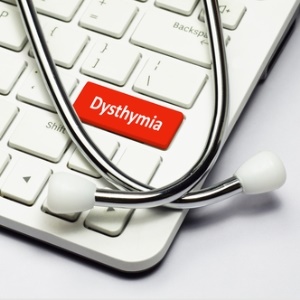
Description
Dysthymia can be described as a long-lasting, less severe experience of depression symptoms. Without treatment, studies have shown that the condition of people suffering from dysthymia tends to progressively deteriorate over time.
It often has an insidious onset. Even with treatment relapse may occur and is often associated with personality pathology.
The long-term consequences of dysthymia may therefore be considered as severe, if not more so, than the short-term experience of a major depressive episode.
Many of the same symptoms as those for a major depressive disorder are present, but they tend to be less severe and interfere less with immediate functioning. They are, however, chronic and may continue for years so that the sufferer seldom feels really happy and that they are enjoying life. Due to the long-term impairment of functioning, many do not realise their full potential. Dysthymia can therefore have severe long-term consequences and can be severely disabling.
Who gets it?
It is thought to affect about 3% to 6% of the population. Dysthymia, like depression, can affect both genders and people of all ages, although it is more common among females, and onset in childhood and adolescence is particularly common. In childhood and adolescence, in particular, the condition is more common in boys (8% for boys and 5% for girls). Dysthymia often co-occurs with other mental illnesses such as major depression, anxiety disorders and substance abuse.
Symptoms
Have you felt sad, blue, down, low and not interested in your usual activities for most of the day, more days than not for at least the past two years (or one year for children and adolescents)? If you have also experienced at least two of the following associated symptoms more or less consistently for over two years, you may be dysthymic:
- eating less or even more than desired
- sleeping more or less than desired
- low energy or tire easily
- low self-esteem
- difficulty making decisions or concentrating
- feelings of hopelessness and despair
- unexplained irritability
- impaired ability to feel pleasure
- decreased productivity
- decreased sex drive
Children and adolescents with dysthymia tend to be more irritable than their peers and they need only experience the above symptoms consistently for one year for a diagnosis to be made.
These symptoms may seem mild, but dysthymia can have significant negative impacts on work and social functioning, and general health and well-being. Dysthymia is also associated with high rates of anxiety and substance abuse, and suicide - incidence is estimated at between 3% to 12%. On a positive note, Klein; Shankman and Rose found in 2006 that 73.9% of their cohort recovery within a mean of 52 months. Unfortunately the risk of relapse was 71.4%.
Can dysthymia lead to major depression?
Although up to 50% of people with dysthymia start symptoms before the age of 25, many go years without treatment as they see their condition as part of life. The greatest risk is that it can lead to full-blown depression.
About 40% of dysthymia sufferers eventually have a major depressive episode, although some studies have reported a lifetime risk of as high as 77% for this group of sufferers.
This serious condition is characterised by interference in normal daily functioning, marked changes in sleeping patterns and appetite; intense feelings of sadness, shame and despair; and thoughts of death and suicide. Up to 40% of persons with major depression also suffer from dysthymia, and this is referred to as double depression
Cause
Dysthymia, like depression, is thought to be caused by a combination of biochemical, genetic and environmental factors.
It seems that certain life events can trigger dysthymia in susceptible people. Such events include:
- adolescent adjustment problems
- life transitions such as moving, or starting a new school or job
- losses and life crises such as death and divorce
- chronic societal problems such as poverty and unemployment
- stress arising from having to cope with illness or abuse
Treatment
Many people with dysthymia, who are well aware they often feel sad or "down", don't recognise that they have an illness for which help is available, or even that it warrants seeking help. This is a great pity, because dysthymia is treatable. No-one should resign themselves or downplay having to endure chronic unhappiness, however mild.
Psychotherapy in conjunction with antidepressant medication is usually the most effective treatment for dysthymia.
Dysthymia appears to respond particularly well to focused, short-term psychotherapies such as cognitive therapy, behaviour therapy and interpersonal therapy. These therapies employ methods to change dysfunctional beliefs and behaviours and address relationship problems associated with the condition.
Dysthymia also appears to be highly responsive to antidepressant drug treatment. About 65% of patients with dysthymia will respond to treatment.
Because their side effects are relatively mild, selective serotonin reuptake inhibitors (SSRIs) such as Prozac (fluoxetine), Aropax (paroxetine), Luvox (fluvoxamine) and Zoloft (sertraline) are now most commonly prescribed medications for people with dysthymia.
Other antidepressants such as the tricyclics (TCAs), monoamine oxidase inhibitors (MAOIs), and the reversible inhibitors of monoamine oxidase (RIMAs) have also been shown to be effective.
Keller and colleagues published a study in 2000 in which they found that a combination of psychotherapy treatment and medication had the best outcome (about 75% improvement on combination therapy as opposed to around 48% for either treatment alone.
Family and group therapy is also of value to help patients and families deal with the symptoms of dysthymia and to teach withdrawn patients social skills.
Treatment goals should be reasonable and attainable. As one author noted: "A person who suffers from dysthymic disorder has generally learned to live with a fair amount of chronic unhappiness in their lives. Realistic goals should be established early-on and the focus of therapy, instead of focusing on the person’s mood state."
Updated by Dr Gerhard Grobler, head of Department of Psychiatry, Steve Biko Academic Hospital, affiliated to the University of Pretoria, June 2010.




 Publications
Publications
 Partners
Partners















